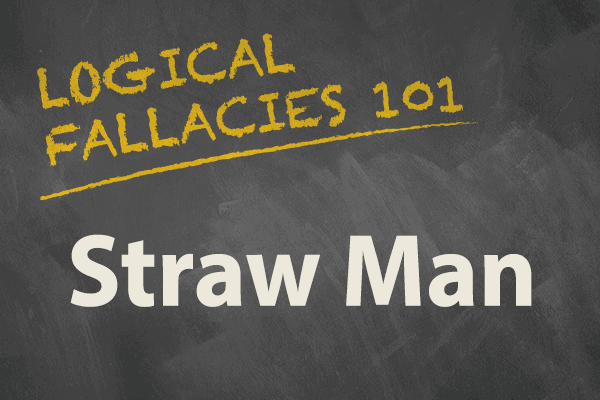Strawmen, scarecrows, and mannequins all have one thing in common: they are, by nature, flimsy objects that are easy to knock down. In the context of logical fallacies, a “straw man” argument is an argument that is framed in such a way that it is easy to “knock down” or dismantle.
How many times have you been in conversation with someone—someone who holds an opposing viewpoint to yours—who frames your position in a way that you have not? Then once they frame your position in that way, they attack it, supposing that by doing so they have won the argument? This week’s fallacy is, arguably, one of the most prevalent, and it’s called the “straw man” fallacy.
During times of medieval debate, debaters often began with a clear presentation of their opponent’s position. In Socratic Logic, Peter Kreeft writes about this saying, “One of the rules of medieval debate was designed to block ‘straw man’ arguments: you must first state your opponent’s idea in your own words (to be sure you understand the idea instead of just parroting the words), to his satisfaction, before you go on to refute it.” Such courtesy is rarely given today; instead, those who have conversations with others of differing opinion often try to discredit the opposing viewpoint by caricaturing it, minimizing its coherence, or conducting any other number of methods as a means of destroying its cogence.
Some Examples…
Those who commit this fallacy can largely be placed in one of two groups: (1) those who commit the fallacy because they intentionally desire to misconstrue their opponent’s viewpoint for an easy takedown or (2) those who commit the fallacy out of ignorance because they don’t know their opponent’s position, and, therefore, they choose instead to interact with a weaker version of the case being made.
The following two examples fit into the first group. (1) Have you heard someone say something like
“Christians are misogynists! And Christianity is misogynistic too! It teaches that women are second class citizens undeserving of human rights!!!! How could anyone, especially a woman, be Christian??!?!?!”
Do you see the “straw man”? They unfairly characterize Christianity; there are millions of Christian women in the world today, and it would be hard to imagine that even one of them believes Christianity espouses women hatred, yet still chooses to be a Christian. Prima facie, it seems ridiculous to make that claim. It’s another question entirely as to whether there are individual Christians in the world who hate women—there just may be. But it is absolutely fallacious to create a “straw man” of Christianity just so it can be knocked down or discredited.
(2) Christians aren’t immune from committing the “straw man” fallacy, either. Concerning the abortion debate, sometimes pro-lifers say something like, “the prochoice view is unconscionable! They believe in killing babies!!!!”
The “straw man” fallacy here is subtle. Nonetheless, subtle fallacies are still fallacies.
Why? Because it can charitably be assumed that most in the prochoice camp don’t literally believe babies should be killed—they just don’t think the unborn are babies. Instead, they think the unborn are mere “cells” or “tissue.” So when those in the prolife camp accuse the other side of desiring to kill babies, making that accusation is just an easy way to knock the argument down
Even when an advocate in the prochoice camp admits it’s a baby, she’ll still make a distinction, albeit arbitrary, between born and unborn. The prochoice camp makes this distinction because they believe that it allows them to say that the unborn are in a different category—a category undeserving of the same rights that people in the born category have. This is the very reason why a prochoice advocate will argue fervently for a women’s right to abort her unborn, but that same woman has no right to terminate the life of her born child. There are fundamental differences between the prochoice and the prolife view of what it means to be a baby, and it seems fallacious to characterize those in the prochoice camp as those who think babies should be killed. One way to avoid this is to ask an interlocutor to explain what she means by the term ‘baby’. No matter what she thinks, it’s only when both sides of the debate understand and/or agree about what it means to be a baby that the claim can be made, “they believe in killing babies!”
How to Avoid the “Straw Man” Fallacy
A great example of a “straw man” fallacy that falls in the second group was evident in a recent debate between SES Professor Emeritus Dr. Richard Howe and Dr. Ed Buckner. This took place at Georgia State University, and if you’re interested in watching, you can do it here: “Does God Exist?” Debate
It was apparent in this debate that Dr. Buckner’s refusal to address Dr. Howe’s arguments arose from his inability to interact with them. Instead of responding to them, Dr. Buckner chose to interact with the weaker/weakest versions of philosophical arguments, albeit the ones espoused by Richard Dawkins in God Delusion. The problem, of course, is that Richard Dawkins isn’t a philosopher, and plenty of philosophers have pointed out the same.[1] Further, even though Dr. Buckner was persuaded by the God Delusion, he would have been able to avoid straw man argumentation by investigating the primary sources in Dawkins’ argument. Instead, he relied on Dawkins’ caricature of them. This, of course, is what his critics noted—that Dawkins failed to understand the philosophical arguments that he chose to critique in his book.
[1] See philosophers such as Michael Ruse, Thomas Nagel, or H Allen Orr.
Be that as it may, this is a poignant example of one who chooses to address the weakest version of an argument and “knock it down” instead of interacting with the stronger version that’s being presented.
In conclusion, the best way to avoid the “straw man” fallacy is for individuals to return to medieval debate courtesy, where both individuals make sure they understand their interlocutor’s point completely before engaging in meaningful discussion.
To inquire more about Southern Evangelical Seminary’s degree program, including courses in Logic, visit www.staging.ses.edu or contact the Seminary directly at 704-847-5795.
[contact-form-7 id=”285″ title=”Contact us”]
[1] See philosophers such as Michael Ruse, Thomas Nagel, or H Allen Orr.









